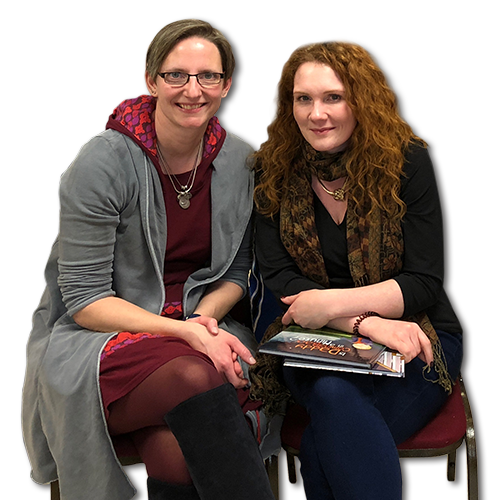Actress Jennie McAlpine, whose dad died last year, investigates for BBC Radio 5 live.
I’ve lost both my parents. My lovely dad died just last year.
My son was two when I lost my dad so Grandad was a really big part of his life.
It felt natural and right to talk to him about it straight away. We told our son about Grandad, and lots of age appropriate books helped us do that.
It’s the hardest conversation you’re ever going to have. And for parents who’ve been through much more trying circumstances than me, it must be incredibly difficult.
How do you explain it to a young child who has never experienced death before?
And how do you talk about it when it’s something that makes you upset too?
Winston’s Wish – a charity which helps children through bereavement – kindly invited me along to one of their family sessions to find out.
Every night, when it’s windy, I think my dad’s going to fly away…because he’s in the sky”
In a community centre in Wigan, tables are laid out with craft activities and games. At one table, two sisters are furiously colouring grains of salt to layer into a ‘memory jar’.
At another table, seven-year-old Evie is cuddling up to her mum Laura and playing with a teddy with a huge zip across its stomach.
Evie tells me it’s a “worry eater” and she feeds it worries that she’s written down on pieces of paper.
Evie’s dad died 18 months ago and her worry today is that: “Every night, when it’s windy, I think my dad’s going to fly away…because he’s in the sky.”
I think the worry eater is a lovely idea, and has clearly been very helpful to young Evie. It shows how important it is to have a place where children can share their thoughts.
Mum Laura tells me how else the sessions have helped.
“Because Evie was six at the time her dad died, just bringing her here and being around other children that have been through the same experience as she has lets her know that she’s not on her own,” she said.
In one corner of the room, Mum Eleanor and her 12-year-old son George are choosing pebbles to put into a small, see-through bag. Pretty, coloured stones signify happy memories while rough, jagged rocks represent more painful times.
Rebekah Lawson, counsellor with Winston’s Wish explains why these activities were so important.
“We know that sometimes children can focus on very painful memories but they also need to focus on the happy memories too,” she said.
“They’re also really worried that their memories won’t last into the future so this gives them a lovely way of having something tangible to remember that person by.”
It also gives parents the opportunity to share sad times. Picking up a rough stone, Eleanor says: “My tough memory today which I’ve never shared with George before is; the day Glynn died, the last thing we did was have an argument. That’s a bit of a tough memory.”
On hearing this, George gives his mum a comforting rub on the head before picking up a coloured stone. It’s so nice to see how open they are with each other.
Eleanor and her three children have been coming to these sessions for seven years.
“The therapy here is great,” she said.
“It’s not sat in a one-to-one counselling room with a brown draylon sofa and a dead plant. It’s doing things like this which facilitate talking rather than talking being the main focus.
“I’m not sure I would have shared that memory if it weren’t for this.
”The session ends with a visit from author Elke Barber who has written two children’s books about death: “Is Daddy Coming Back in a Minute?” and “What Happened to Daddy’s Body?”
Elke’s husband collapsed suddenly whilst on a ‘boys’ holiday’ in the Lake District with their three-year-old son. The little boy managed to call an ambulance but his father had already died by the time it arrived.
“Children don’t know what death is. To them it’s just a word,” said Elke. “He came out with all these questions: ‘How many sleeps until I have to die?’ and ‘Will we have to sell the house, Mummy?’
“The questions he came out with were mind-boggling.”
Elke tried to find a book to help her answer all these questions and – when she couldn’t – decided to write her own.
“We need to give our children so much more credit for what they understand”
“What pops in your head when you say the word ‘death’? Chances are it’s not a very nice thing,” said Elke. “What do you think pops into the head of a three-year-old? The answer is ‘nothing’.
“They don’t know what death is, they don’t even know it’s possible for people to die. They just think their parents are always going to be there.”
Elke believes shying away from difficult questions makes it harder for children to make sense of what’s happened.
“We need to give our children so much more credit for what they understand,” she said. “We can’t protect them from everything, it’s our job to help them understand and give them some level of emotional resilience to deal with these things when they happen.”
My day with the families and counsellors at Winston’s Wish was even more remarkable than I had expected. I could see how the mums and children were able to speak openly about painful memories and worries that could have caused so much anxiety if they’d been kept inside.
Everyone I met today agreed that remembering a loved one can be enjoyable – even when it’s sad. I’m looking forward to going home and making a memory jar and a pebble bag with my son so that we can keep those chats about Grandad a big part of our lives.
Published on Feb 23, 2018

